★★★
“Home on the (gun-)range”
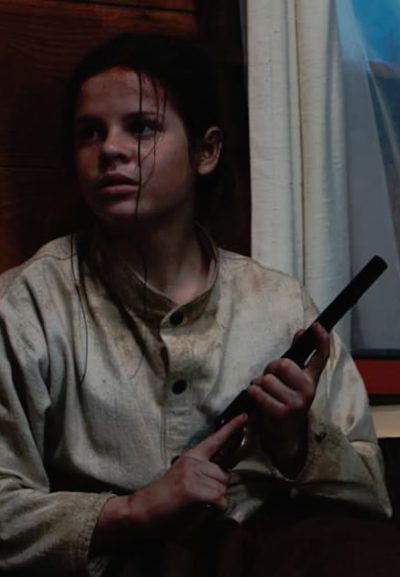 This one does take a while to reach the necessary threshold: probably only truly qualifies for the final twenty minutes or so, though it does talk a good game until that point. Also, it’s a decent enough combination of Western and home-invasion genres to that point, to pass muster. Nothing special, mind you. It just knows its limitations and is careful enough to work within them. It takes place in the Old West. whee Beth (Bernadette) and her twin children, Brian and Irene (Betsy) now live with her new husband, Robert (Krause). The trio appear to have escaped an abusive relationship, and it’s not long after a railroad surveyor pays a visit, before Irene is cheerfully telling him, she’s going t go back and killer her father some day.
This one does take a while to reach the necessary threshold: probably only truly qualifies for the final twenty minutes or so, though it does talk a good game until that point. Also, it’s a decent enough combination of Western and home-invasion genres to that point, to pass muster. Nothing special, mind you. It just knows its limitations and is careful enough to work within them. It takes place in the Old West. whee Beth (Bernadette) and her twin children, Brian and Irene (Betsy) now live with her new husband, Robert (Krause). The trio appear to have escaped an abusive relationship, and it’s not long after a railroad surveyor pays a visit, before Irene is cheerfully telling him, she’s going t go back and killer her father some day.
Turns out she doesn’t have to wait that long to carve some notches on her gun-belt. Because the “surveyor” is actually the advance scout for a gang of outlaws. for Robert wasn’t exactly an angel in his previous life either. He was part of a gang led by Ezekiel (Scurlock) and absconded with their loot. This bit of treachery has finally caught up with him, an his old associates are now ready to make him cough up the location of what they consider their rightful, if ill-gotten gains. They arrive one night, taking the family hostage in an effort to use them against Robert. However, they’ve forgotten about Beth, who has clearly had enough of this male nonsense, and in particular. Irene, who embraces wholeheartedly the opportunity to get some practice in for her future paternal reunion.
As mentioned, we do have to take a detour before the distaff side of the family take centre-stage. Robert and Brian are more or less useless. The former’s efforts to negotiate with his former pals go about as well as you would expect, and Brian is just no good for anything, especially after getting shot in the leg. This is retaliation for his sister stabbing one of the outlaws in the foot: in hindsight, they would have been much better off shooting Irene, considering she is the one who causes them no end of trouble, the deeper we get into the movie.
Eventually, for different reasons, Robert and Brian are no longer of significance, with first Beth and then Irene, finally getting the chance to show it was a fate mistake to overlook them. It’s a very good example of firearms as an equalizer. In a physical fight, they’d have no chance against men who are clearly much larger and more powerful. However, with a gun in their hand, and a steely resolve to use it in defense of their own survival, then strength is no longer a factor. How things unfold is mostly quite predictable, to be honest, yet is done with a reasonable amount of energy. and helped by performances which all feel like they are on the same page dramatically. All told, the ending justifies the means, I’d say.
Dir: Ehrland Hollingsworth
Star: Betsy Sligh, Jamie Bernadette, Brian Krause, Scot Scurlock





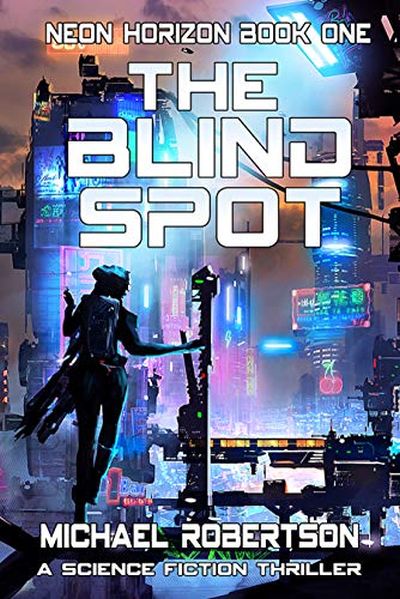 On the surface, Scala City is an idyllic, hi-tech world of prosperity, peace and morality, albeit at the cost of omnipresent surveillance of its residents. But there’s a dirty little secret. The Blind Spot is an area where surveillance is barred, and where the citizens of Scala City go to blow off their sordid steam. Its residents have cybernetically enhanced bodies, something rejected by Scala City, and a zero-tolerance policy for any kind of monitoring. It’s run by Wrench, who has kept his daughter Marcie Hugo under strict control since the death of her mother. However, like all teenagers, the 16-year-old Marcie is seeking to spread her wings, and has been making covert excursions into Scala City, with the aim of moving there some day soon.
On the surface, Scala City is an idyllic, hi-tech world of prosperity, peace and morality, albeit at the cost of omnipresent surveillance of its residents. But there’s a dirty little secret. The Blind Spot is an area where surveillance is barred, and where the citizens of Scala City go to blow off their sordid steam. Its residents have cybernetically enhanced bodies, something rejected by Scala City, and a zero-tolerance policy for any kind of monitoring. It’s run by Wrench, who has kept his daughter Marcie Hugo under strict control since the death of her mother. However, like all teenagers, the 16-year-old Marcie is seeking to spread her wings, and has been making covert excursions into Scala City, with the aim of moving there some day soon.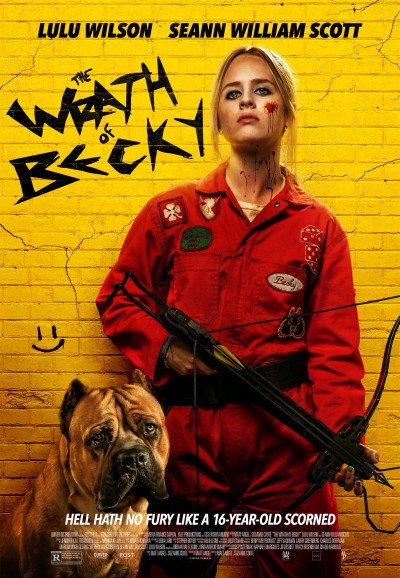 Don’t mess with someone else’s dog. This is a good rule of thumb in most cases, but especially so when the owner is an unhinged teenage psychopath, with the both the talent and desire to inflict carnage in retribution. The
Don’t mess with someone else’s dog. This is a good rule of thumb in most cases, but especially so when the owner is an unhinged teenage psychopath, with the both the talent and desire to inflict carnage in retribution. The 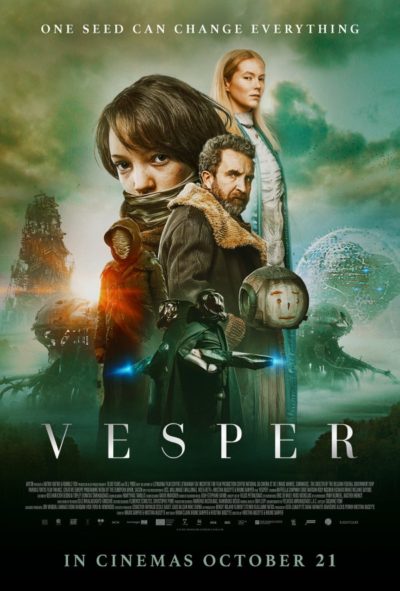 As the above suggests, I was getting a strong manga influence, in particular from the works of Hayao Miyazaki: it feels like the script could have been something he’d have written on a gloomy Wednesday in January. Feisty teenage heroine? Check? Ecological message? Check. For this takes place after some kind of change in the world, which has left the bulk of the population clinging on to existence by their grubby fingernails, in a world now owned by bizarre flora. Vesper (Chapman) is one such, tending to her paralyzed father (Brake) whose consciousness has been transferred into a drone. She trades with her uncle, Jonas (Marsan), swapping blood for the seeds they need to survive.
As the above suggests, I was getting a strong manga influence, in particular from the works of Hayao Miyazaki: it feels like the script could have been something he’d have written on a gloomy Wednesday in January. Feisty teenage heroine? Check? Ecological message? Check. For this takes place after some kind of change in the world, which has left the bulk of the population clinging on to existence by their grubby fingernails, in a world now owned by bizarre flora. Vesper (Chapman) is one such, tending to her paralyzed father (Brake) whose consciousness has been transferred into a drone. She trades with her uncle, Jonas (Marsan), swapping blood for the seeds they need to survive.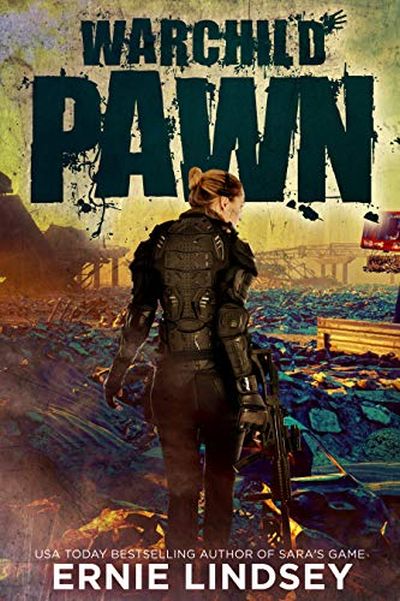 This dystopian future takes place after the United States of America is no longer united, having fragmented into a group of disparate regions that exist in an uneasy piece with each other. The heroine is 14-year-old Caroline, who lives in a remote part of the Appalachians, her town loosely affiliated to the People’s Republic of Virginia. She’s a scout, and one day encounters forces from the Democratic Alliance. The population of her village who escape, head towards the state capital of Warrenville, pursued by the invading army. On the way, Caroline begins to come into startling abilities which were literally injected into her as a small child.
This dystopian future takes place after the United States of America is no longer united, having fragmented into a group of disparate regions that exist in an uneasy piece with each other. The heroine is 14-year-old Caroline, who lives in a remote part of the Appalachians, her town loosely affiliated to the People’s Republic of Virginia. She’s a scout, and one day encounters forces from the Democratic Alliance. The population of her village who escape, head towards the state capital of Warrenville, pursued by the invading army. On the way, Caroline begins to come into startling abilities which were literally injected into her as a small child.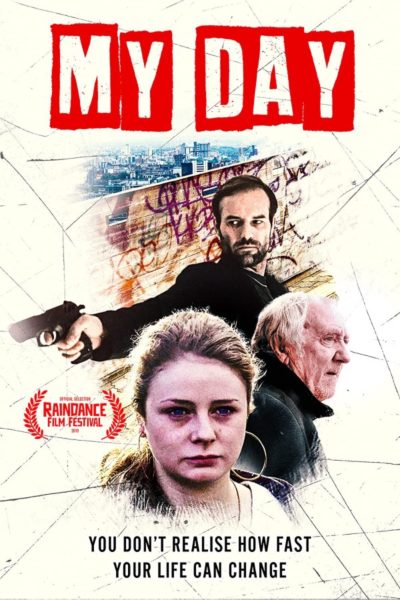 Sixteen-year-old Ally (Smith) is living her life very much on the fringes of society. Coming from a broken home, she is now homeless on the streets of London, relying on the dubious charity of questionable friends. Though Ally does have her limits as to what she’s prepared to do, she has no issue with occasional bits of work, delivering drugs for dodgy couple Carol and Gary. It’s this that gets her into trouble: a job goes wrong, after the customer tries to rape her, and Ally flees – without either the drugs or the money. Carol and Gary are bad enough. Yet even they live in mortal fear of their boss, Eastern European gangster Ilyas (Adomaitis). He wants his merch back – and Ally, as interest, for sale to his sex trafficking friends.
Sixteen-year-old Ally (Smith) is living her life very much on the fringes of society. Coming from a broken home, she is now homeless on the streets of London, relying on the dubious charity of questionable friends. Though Ally does have her limits as to what she’s prepared to do, she has no issue with occasional bits of work, delivering drugs for dodgy couple Carol and Gary. It’s this that gets her into trouble: a job goes wrong, after the customer tries to rape her, and Ally flees – without either the drugs or the money. Carol and Gary are bad enough. Yet even they live in mortal fear of their boss, Eastern European gangster Ilyas (Adomaitis). He wants his merch back – and Ally, as interest, for sale to his sex trafficking friends. A disease sweeps the planet, killing billions. The only ones with any hope of surviving in the outside world are the young, a small number of whom appear to have a natural immunity. Five years on, and Ellie is one of the few to have endured, scraping for a life among the leftovers of civilization. But she and the other survivors are the targets for the Stalkers: roaming groups of biohazard-suit clad hunters in white vans. They seek to capture the immune, for use in a project to develop a vaccine that can allow the elite to come out of their safe havens. While trying to avoid them, she encounters Quinn (Smith), another survivor with a wealth of knowledge, and a hard-edged approach to life. Initially, Quinn wants nothing to do with Ellie, though eventually realizes two heads can sometimes be better than one, in the never ending struggle to stay alive and free.
A disease sweeps the planet, killing billions. The only ones with any hope of surviving in the outside world are the young, a small number of whom appear to have a natural immunity. Five years on, and Ellie is one of the few to have endured, scraping for a life among the leftovers of civilization. But she and the other survivors are the targets for the Stalkers: roaming groups of biohazard-suit clad hunters in white vans. They seek to capture the immune, for use in a project to develop a vaccine that can allow the elite to come out of their safe havens. While trying to avoid them, she encounters Quinn (Smith), another survivor with a wealth of knowledge, and a hard-edged approach to life. Initially, Quinn wants nothing to do with Ellie, though eventually realizes two heads can sometimes be better than one, in the never ending struggle to stay alive and free.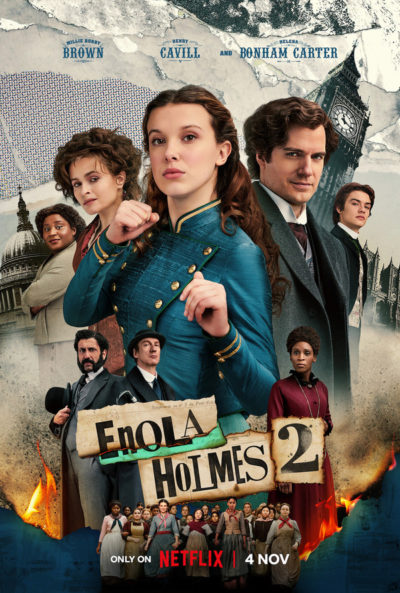 I had forgotten how much I really did not like the
I had forgotten how much I really did not like the 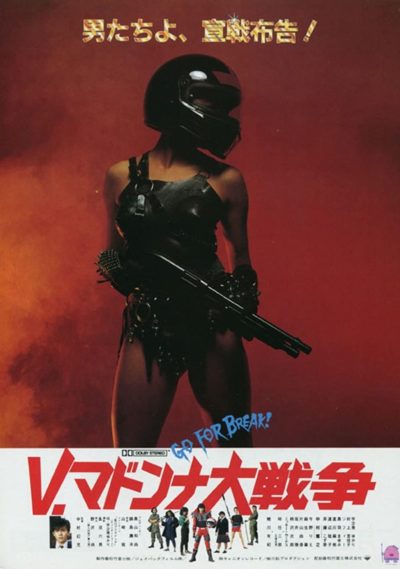 I have so many questions about the Japanese education system after watching this. It takes place in a high school whose student council is repeatedly being squeezed for extortion money by the Yagyu, a local biker gang. They ride up to the place, beating up and terrorizing the students, and generally making a nuisance of themselves. Where, exactly, is the principal when all this is going on? Teachers? Concerned parents? There is a throwaway line about how reporting things to the police would only make the gang attack harder. But you’d think
I have so many questions about the Japanese education system after watching this. It takes place in a high school whose student council is repeatedly being squeezed for extortion money by the Yagyu, a local biker gang. They ride up to the place, beating up and terrorizing the students, and generally making a nuisance of themselves. Where, exactly, is the principal when all this is going on? Teachers? Concerned parents? There is a throwaway line about how reporting things to the police would only make the gang attack harder. But you’d think 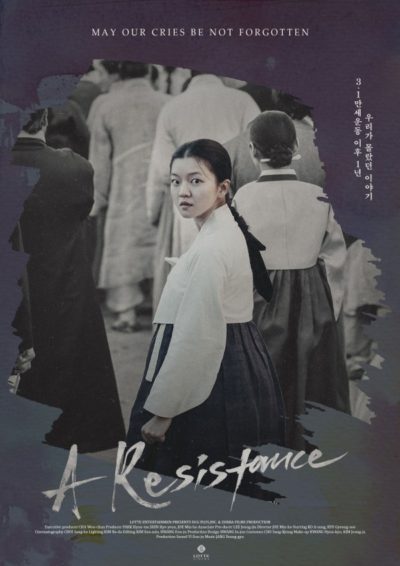 This takes place in 1919-20, when Korea was under occupation by the Japanese [there seems to be quite a lot of this about; I’ve seen a bunch of Chinese movies set when that country was occupied by Japan as well]. Even demonstrating against the Japanese, or in favour of Korean independence, was sternly forbidden, with those taking part likely to be arrested and thrown in prison for months. If they were lucky, that is: an opening caption tells us 7,500 were killed in the protests or died in jail subsequently. Even for those merely arrested, this was not a “nice” prison, to put it mildly, with horrendously over-crowded conditions (24 to a cell!), freezing temperatures and meagre rations.
This takes place in 1919-20, when Korea was under occupation by the Japanese [there seems to be quite a lot of this about; I’ve seen a bunch of Chinese movies set when that country was occupied by Japan as well]. Even demonstrating against the Japanese, or in favour of Korean independence, was sternly forbidden, with those taking part likely to be arrested and thrown in prison for months. If they were lucky, that is: an opening caption tells us 7,500 were killed in the protests or died in jail subsequently. Even for those merely arrested, this was not a “nice” prison, to put it mildly, with horrendously over-crowded conditions (24 to a cell!), freezing temperatures and meagre rations.